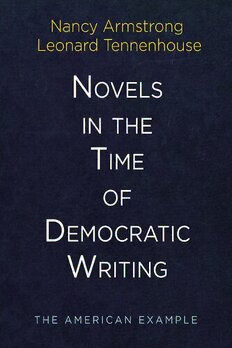
Novels in the Time of Democratic Writing: The American Example PDF
Preview Novels in the Time of Democratic Writing: The American Example
Novels in the Time of Democratic Writing This page intentionally left blank Novels in the Time of Democratic Writing The American Example Nancy Armstrong and Leonard Tennenhouse university of pennsylvania press philadelphia Haney Foundation Series A volume in the Haney Foundation Series, established in 1961 with the generous support of Dr. John Louis Haney Copyright © 2018 University of Pennsylvania Press All rights reserved. Except for brief quotations used for purposes of review or scholarly citation, none of this book may be reproduced in any form by any means without written permission from the publisher. Published by University of Pennsylvania Press Philadelphia, Pennsylvania 19104- 4112 www.upenn.edu/pennpress Printed in the United States of America on acid-f ree paper 10 9 8 7 6 5 4 3 2 1 Library of Congress Cataloging- in- Publication Data Names: Armstrong, Nancy, 1938– author. | Tennenhouse, Leonard, 1942– author. Title: Novels in the time of democratic writing : the American example / Nancy Armstrong and Leonard Tennenhouse. Other titles: Haney Foundation series. Description: 1st edition. | Philadelphia : University of Pennsylvania Press, [2018] | Series: Haney Foundation series | Includes bibliographical references and index. Identifiers: LCCN 2017032703 | ISBN 9780812249767 (hardcover : alk. paper) Subjects: LCSH: American fiction—18th century—History and criticism. | American fiction—19th century—History and criticism. | Democracy in literature. | Comparative literature—American and English. | Comparative literature—English and American. | Nationalism and literature—United States—History—18th century. | Nationalism and literature—United States—History—19th century. Classification: LCC PS375 .A76 2018 | DDC 813/.209—dc23 LC record available at https://lccn.loc.gov/2017032703 For Ellen Rooney and Khachig Tölölyan This page intentionally left blank Contents Introduction. Argumentum ad Populum 1 Chapter 1. Style in the Time of Epidemic Writing 17 Chapter 2. Refiguring the Social Contract 34 Chapter 3. Novels as a Form of Democratic Writing 60 Chapter 4. Dispersal 82 Chapter 5. Population 101 Chapter 6. Conversion 119 Chapter 7. Hubs 139 Chapter 8. Anamorphosis 159 Chapter 9. Becoming National Literature 184 Notes 213 Works Cited 233 Index 245 Acknowledgments 251 This page intentionally left blank Introduction Argumentum ad Populum We are in the epoch of simultaneity: we are in the epoch of juxta- position, the epoch of the near and far, the epoch of the side-b y- side. We are at a moment, I believe, when our experience of the world is less that of a long life developing through time than that of a net- work that connects points and intersects with its own skein. — Michel Foucault, 1967 Foucault’s reading of the cultural environment in which he found himself in 1967 anticipates the very system of social relations in which the most interest- ing twenty- first- century novels invite a global readership to take part. If this passage did not exactly leap off the page on our first reading, it has certainly captured our attention now, at a time when traditional households and na- tional governments are conspicuously failing to distribute natural resources, goods, services, and information to the populations they are meant to serve. Where Foucault’s shift in perspective registers a definitive break from the past, we have come to understand that his sense that something unprecedented has happened is not a new one, even though the infrastructure in which our lives are now caught up is of greater magnitude than ever before. We are convinced that so long as there have been novels, there have also been readers who can imagine human experience from either near or far, either “as a long life devel- oping in time” or as “a network that connects points and intersects with its own skein.” As novel readers, we have always been both local and global, be- cause we can only be either in relation to the other. The very break from the past that Foucault experienced in 1967 was in the making as early as the late eighteenth century when the colonies in British
